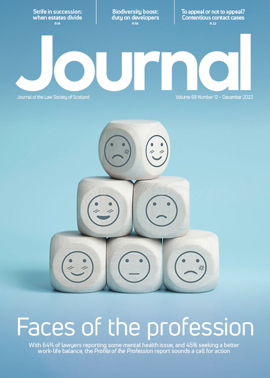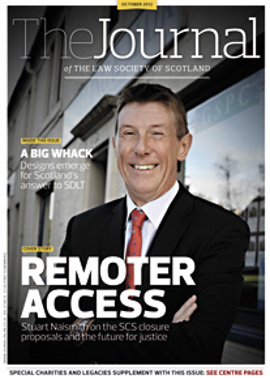Scottish Solicitors' Discipline Tribunal
Roderick Graham Mickel
A complaint was made by the Council of the Law Society of Scotland against Roderick Graham Mickel, formerly of Graham Mickel & Co, 38 James Square, Crieff. The Tribunal found the respondent guilty of professional misconduct in respect of his acting for two clients in the same conveyancing transaction when one of the clients was not an established client and there was accordingly a conflict of interest in breach of rule 3 of the Solicitors (Scotland) Practice Rules 1986.
The Tribunal censured the respondent and directed in terms of s 53(5) of the Solicitors (Scotland) Act 1980 that any practising certificate held or to be issued to the respondent shall be subject to such restriction as will limit him to acting as a qualified assistant and to being supervised by such employer or successive employers as may be approved by the Council or the Practising Certificate Subcommittee of the Council of the Society, and that for an aggregate period of at least three years.
The Tribunal considered that acting for both parties in this transaction involved a clear conflict of interest and breach of the 1986 Practice Rules. The Tribunal considered that the respondent’s having acted for both parties in a conveyancing transaction where both were not existing clients could be regarded by competent and reputable solicitors as a serious and reprehensible departure from the standards expected from those within the profession. In considering sanction, the Tribunal noted that the misconduct related only to a single transaction. It noted that the respondent had appeared before the Tribunal, had candidly admitted his failure and had shown a keenness to have the matter resolved. However, the Tribunal was concerned about the risk of this failure being repeated should the respondent return to the profession and again be put under pressure by clients, and accordingly restricted his practising certificate.
Paul Anthony McConville
A complaint was made by the Council of the Law Society of Scotland against Paul Anthony McConville, solicitor, Hamilton. The Tribunal found the respondent guilty of professional misconduct in respect of his failure or unconscionable delay in replying to the reasonable enquiries of the Society and complying with notices served on him by the Society in respect of numerous clients, his failure to reply to fellow solicitors, his failure or delay in implementing mandates, his failure to respond to clients, his failure to account timeously to clients, his failure to progress a claim on behalf of a client and his failure to honour a cheque drawn on his client account.
The Tribunal censured the respondent and restricted his practising certificate for an aggregate period of 10 years and thereafter until such time as he satisfies the Tribunal that he is fit to hold a full practising certificate.
The Tribunal was extremely concerned by the numerous failures to respond to the Society. Solicitors have a duty to co-operate with the Society and provide full and accurate explanations in respect of any matter that is the subject of a complaint. Failure by solicitors to do this hampers the Society in the performance of its statutory duty and brings the profession into disrepute. The respondent in this case also failed to respond to clients, to other solicitors, delayed in accounting and failed to deal with mandates. The Tribunal had no hesitation in finding the respondent guilty of professional misconduct.
The Tribunal noted that there was no financial impropriety or dishonesty and that all the clients had eventually received full accounting. It noted the medical report and the references lodged, but considered that the respondent was not a fit person to be a principal in private practice. The Tribunal’s main concern was for protection of the public. It considered the appropriate disposal to be a restriction on the respondent’s practising certificate, to ensure he works under supervision for an extended period to enable him to be rehabilitated. At the end of the 10 year period the respondent will have to satisfy the Tribunal that he is a fit and proper person to hold a full practising certificate.
website: www.ssdt.org.ukIn this issue
- Players and winners
- Access to client money?
- Tax and residential property
- Trusts and the family business
- Planning: the next level
- Reading for pleasure
- Opinion: Tom Mullen/Alan Paterson
- Council profile
- Book reviews
- President's column
- Deed plan criteria
- Decision time for justice
- "Can do": can you?
- Taxes heading north
- When the agent answers
- Taking care of child cases
- Collective redress
- Making sense of hearsay rules
- Don't forget the register
- Alcohol: the healthy option
- Seeding scheme is a draw
- Scottish Solicitors' Discipline Tribunal
- Human trafficking: is the system responding?
- Power points and positive rights
- A way to apply yourself
- Society presents "ambitious plans"
- Law reform roundup
- Business benefits
- On the right track
- Ask Ash
- Business radar
- Legacies: the untapped potential
- Charity begins at law
- Love them and leave to them
- Those difficult relatives






